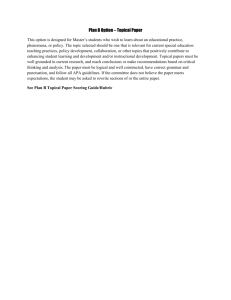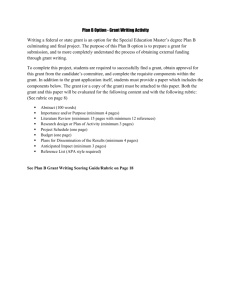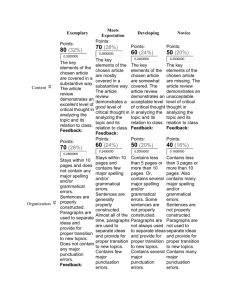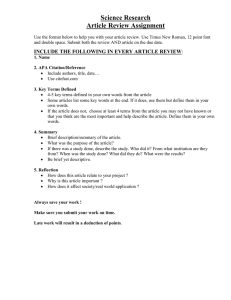Product Development Description and Rubric
advertisement
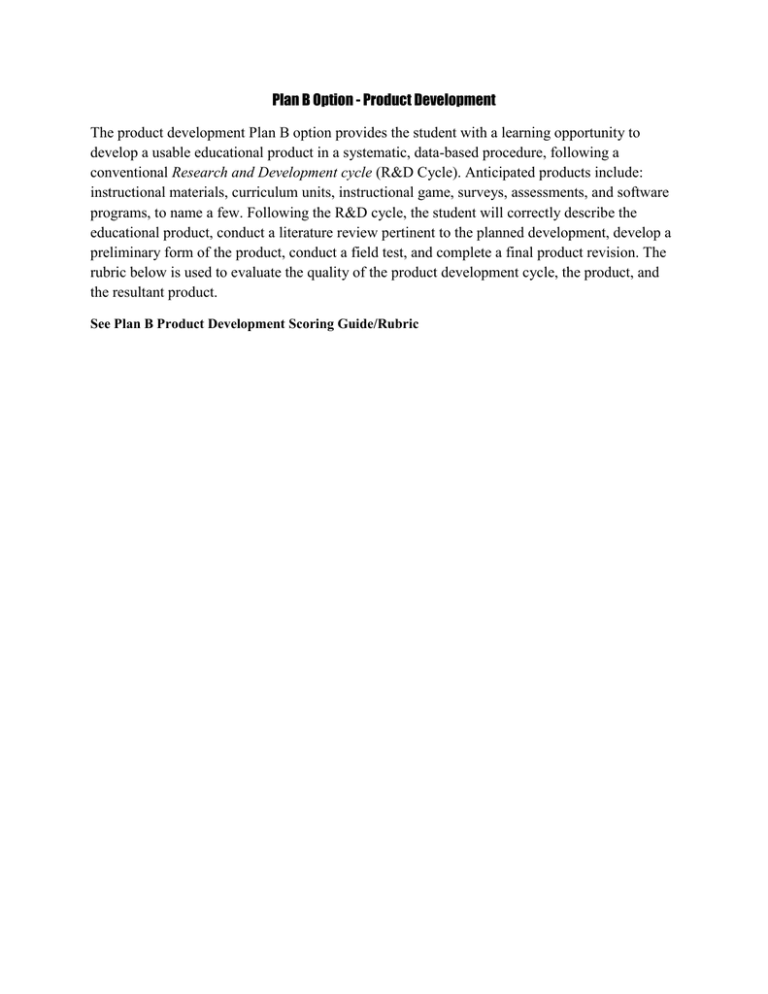
Plan B Option - Product Development The product development Plan B option provides the student with a learning opportunity to develop a usable educational product in a systematic, data-based procedure, following a conventional Research and Development cycle (R&D Cycle). Anticipated products include: instructional materials, curriculum units, instructional game, surveys, assessments, and software programs, to name a few. Following the R&D cycle, the student will correctly describe the educational product, conduct a literature review pertinent to the planned development, develop a preliminary form of the product, conduct a field test, and complete a final product revision. The rubric below is used to evaluate the quality of the product development cycle, the product, and the resultant product. See Plan B Product Development Scoring Guide/Rubric Scoring Guide/Rubric for Plan B Product Development Option The following scoring guide is used to evaluate the quality of the product and procedure. Component Below Expectations (0 pt/component) Product Selection A description of how the proposed product meets and educational need is not provided. The description of the proposed product is incomplete or not clear. There is no statement about how it will be used. Literature Review Preliminary Form of the Product Field Test Final Product Revision Implementation APA Writing Mechanics No literature review provided. Literature cited not relevant to product. Insufficient number of citations (less than 12). Misunderstanding of literature. Product not based on need identified in literature review. Incomplete or unsatisfactory description of product is provided. No description on how to use the product is provided. No mention of field test is provided. Inadequate description of how field test will be conducted. No revisions made based on feedback. Inadequate number of revisions made. Product is not used. No outcomes reported. References (citations and References section), format of paper, tables, data and figures, and supporting evidence do not follow APA guidelines. Two or more spelling, punctuation, or grammatical errors. Meets Expectations (1 pt/component) A clear description of how the proposed product meets an educational need is provided. A clear description of proposed product is provided, as well as how it will be used. A reasonable time line is provided to develop and test the proposed product. Literature review relevant to product specified. Adequate literature review provided (12+ references). Need for product supported. Product developed is based on local need and professional need identified in literature review. Adequate description of product is provided. Adequate description on how to use product is provided. Adequate description of field test is provided (e.g., number of participants, how feedback will be obtained). All revisions made based on feedback. Adequate description of outcomes presented. Exceeds Expectations (2 pts/component) A thorough and persuasive description of how the proposed product meets and educational need is provided. The proposed product is extensively described, and several objectives relating to its use are specified. The time line provided to develop and test the proposed product is highly detailed and specific. Extensive literature review provided (15+ references). Clear and full understanding of references cited. Need for product well supported in research. Extensive and highly detailed description of product is provided. Clear, easy-to-follow directions on how to use the product are provided. Detailed description of how field test will be conducted. Formal analysis of feedback conducted (i.e., pre-/posttest). Clear description of how feedback will be used to make revisions. Revisions made are discussed in terms of field test data, functional objectives of product, and anticipated findings. Full description of outcomes provided. Thoughtful discussion of how findings will impact instructional delivery, professional practice, or district/agency policy. Most sections (i.e., approximately 80 percent) follow APA guidelines. All sections and subsections of paper follow APA guidelines. One spelling, punctuation, or grammatical error. No spelling, punctuation, or grammatical errors. Each component of the thesis will be graded based on the rubric described above. Proficiency will be determined as follows: Exceeds expectations: 14-16 points Meets expectations: 12-13 points Below expectations: 11 points or below
